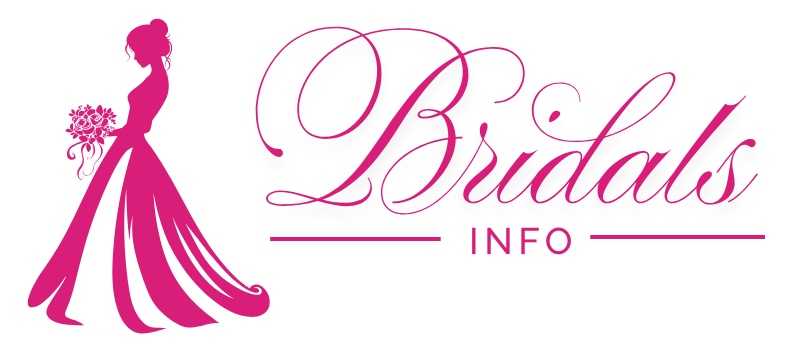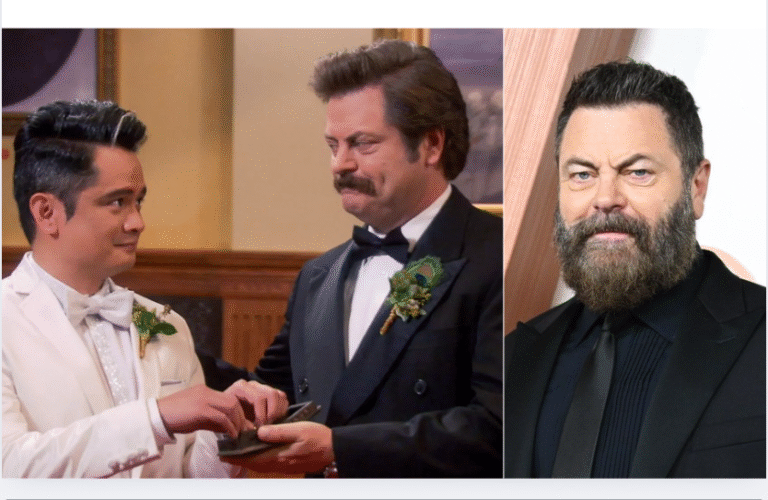Not only was Ron Swanson following wedding protocol when he stood quietly next to Typhoon in the last episode of Parks and Recreation, but he was also redefining a beloved character through quiet devotion. One of television’s most strikingly successful attempts at subdued inclusion is that scene, in which Ron plays best man at the wedding of his flamboyant hairdresser Typhoon and the dramatic Craig. Applause and glitter were unnecessary. It required presence. And with his characteristic stoicism, Ron gave it.
The actor who played Ron, Nick Offerman, recently brought this moment back into the public eye by directly responding to a homophobic meme that misrepresented his character. Michael Flynn Jr.’s post, which included a doctored GIF of Swanson trashing a rainbow flag as a rejection of LGBTQ+ celebration, attempted to use Ron’s image to make fun of Pride Month. With a decisive clapback, Offerman, who never holds back, said, “Ron Swanson was the best man at a gay wedding.” #HappyPride.
| Name | Ron Swanson (Fictional Character) |
|---|---|
| Portrayed By | Nick Offerman |
| TV Series | Parks and Recreation (NBC) |
| Occupation in Show | Director, Pawnee Parks Department |
| Defining Trait | Libertarian, Stoic, Bacon Enthusiast |
| Cultural Role | Best Man at Same-Sex Wedding (Typhoon & Craig) |
| Episode Significance | Series Finale, 2015 |
| Known Relationships | Leslie Knope, Donna Meagle, Typhoon |
| Character Legacy | Unexpected LGBTQ+ Ally Representation |
| Actor’s Real Stance | Vocal Supporter of LGBTQ+ Rights |
| Reference Link |
Ron Swanson’s persona, which is frequently appropriated as a libertarian or macho figurehead, was never one-dimensional, as that one sentence, which was incredibly clear and perfectly timed, reminded audiences. His strong belief in freedom and privacy was his defining characteristic. Ron respected other people’s choices as long as they stayed in their lane. Interference, not identity, was his problem.
Ron is renowned for his rough independence, love of woodworking, and contempt for government red tape throughout the series. But one of those traits—that he doesn’t judge people based on their lifestyle—stands out for how it has held up over time. A beautifully nuanced shift was seen by viewers, especially in his interaction with Typhoon. Donna introduced them, and to everyone’s surprise, including his own, Ron took a quick liking to the outspoken and gregarious stylist. The contrast was eerily reminiscent of the improbable cross-cultural and cross-identity friendships that arise when barriers are subtly disregarded.
Gay representation in sitcoms was already on the rise by 2015, when the finale aired. Characters like Ron, however, who might otherwise be confined to conventional or regressive clichés, were rarely given that kind of respectful arc in television. A noticeably better representation of masculine acceptance was provided by the addition of Typhoon and Craig’s wedding and Ron’s involvement in it. It wasn’t obtrusive or theatrical. It was authentic.
Offerman has continuously emphasized this philosophy in recent years. Offerman experienced a surge of homophobic criticism after playing a survivalist named Bill in HBO’s The Last of Us who develops feelings for another man. His mentions were bombarded with insults from social media trolls, but the actor responded patiently and clearly rather than angrily. In an award speech, he stated, “It’s not a gay story.” “It is a tale of love.”
That phrase had an impact outside of the award room. Offerman highlighted the universality of connection by telling the story through emotion rather than orientation, which is a viewpoint that is especially helpful when cultural attitudes are changing. Particularly for viewers who might have previously objected to such representations, his speech was both enlightening and reassuring.
Today, Ron Swanson’s legacy holds a fascinating place in the entertainment industry. Groups frequently mistakenly idolize him, ignoring his compassion in favor of concentrating solely on his obsession with bacon and contempt for bureaucracy. However, the picture changes dramatically if you follow his relationships, especially with gay friends and female coworkers. Ron has no antipathy. He opposes interference. That is an important distinction that is often misinterpreted.
We witness something that is rarely seen in sitcoms in that last wedding scene: a traditionally masculine character tacitly endorsing a same-sex union without requiring recognition. He doesn’t inquire as to why. He doesn’t feel awkward. He just honors the moment and stands by his friend, as a best man should.
It’s a quiet revolution in culture. It practices rather than preaches. Characters like Ron, which are nuanced and complex, provide a potent counterpoint at a time when public discourse is frequently dominated by social media outrage. Politicization is not what they are requesting. However, when they are, their actual behavior speaks louder than any meme.
The reappearance of Ron’s best man moment is a welcome reminder to fans that declarations aren’t always necessary for representation. Sometimes it’s just about being present, about living up to important ideals, and about letting dignity speak for itself.
Furthermore, Nick Offerman’s influence goes well beyond the screen as he continues to speak out through his words and roles. Not only is he standing up for a fictional character, but he is also changing the way that people talk about compassion, masculinity, and the silent power of choosing acceptance over praise.

